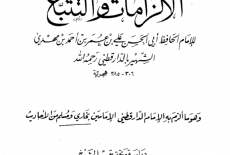The doubtful words of transmission in a sanad
The Science of Sanad is very intrinsic and a meticulous study. A short example displaying its meticulousness is the following paragraph that reflects the keen eye of the muhadditheen
——————–
Al-Imamul Muslimeen Majd ud-deen al-Jazary ibn al-Athir (D. 606 A.H) said :
وللإسناد أوضاع واصطلاح وشرائط. فمن شروطه
Isnad has positions, terms, and conditions and from the conditions are :
فمن شروطه: أن لا يكون في الإسناد: أُخْبِرْت عن فلان، ولا حُدِّثت، ولا بَلَغَني، ولا رَفَعه فلان، ولا أظنه مرفوعًا، إنما يرويه المحدِّث عن شيخ يُظْهِر
سماعه منه والسن يحتمله، وكذلك سماع شيخه عن شيخه، إلى أن يصل الإسناد إلى صحابي مشهور، إلى رسول الله – صلى الله عليه وسلم -.
Isnad should not contain (the following words as they reflect a degree of doubt on the one who is narrating and do not amount to certainty):
(i) I was told about so and so (Ukhbirt `an fulaan),
(ii) I was told (Huddithat),
(iii) It reached me (Balaghani), [1]
(iv) so and so ascribed elevated it or attributed it to the Messenger (Raf`a Fulaan)
However, a narrator should narrate it from a shaykh from whom he heard the Hadeeth (mostly directly) and the lifetime of the narrator corresponds with the lifetime of the shaykh (i.e. both are alive when he hears the narration from that shaykh) Likewise, the hearing of a shaikh from his shaykh (teacher) until the chain of transmission reaches a famous Sahabi and then to the Messenger of Allah (sallalahu `alayhi wa sallam)……..(cont)
[Ref: Jami` al-Usul fi Ahadeeth ar-rasool 1/107]
A good book based on 3 main sections
Ar-rukn al-Awwal – Introduction
Ar-rukn ath-thaani – the benefits
Ar-Ruk ath-Thaalith – Conclusion
each section has a variety of sub-chapter discussing what the name of the book describes perfectly i.e the compilation of the principles (to be known) in (studying) the prophetic traditions
[1] Notice that when someone says Ballighani i.e it reached me that the prophet said such and such , the degree of affirmity automatically is suspected because we all know that to attribute something to the prophet we need a chain of narration . If someone say for e.g 200 years after the prophet’s death says it has reached me that the prophet did such and such, the very first question that would come to mind is “How did this reach him, via whom? is the chain authentic? is it verified? “







